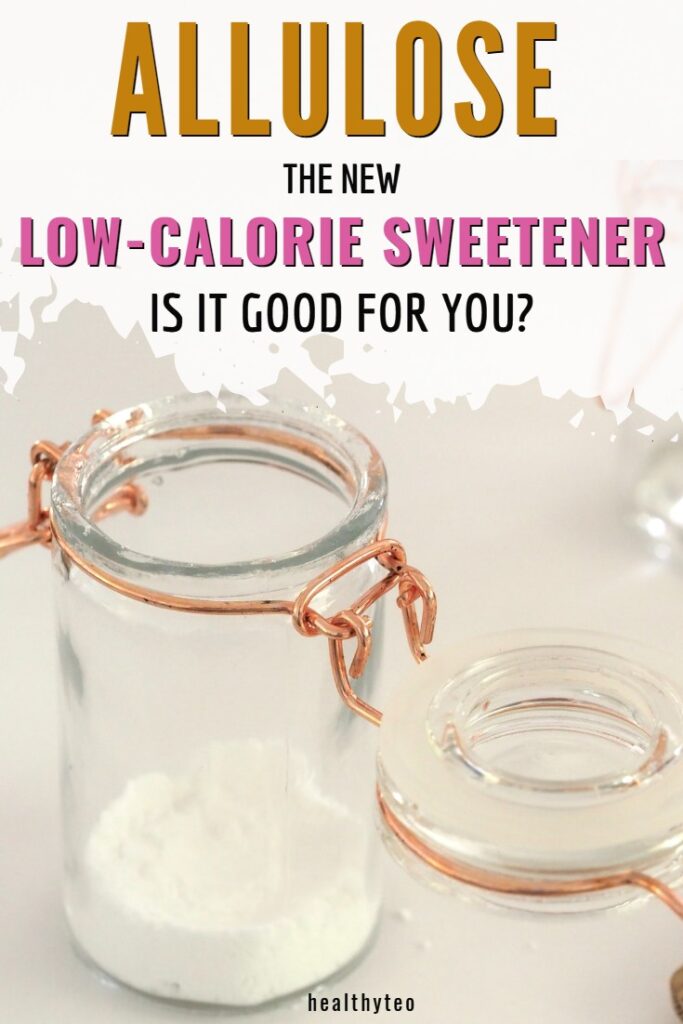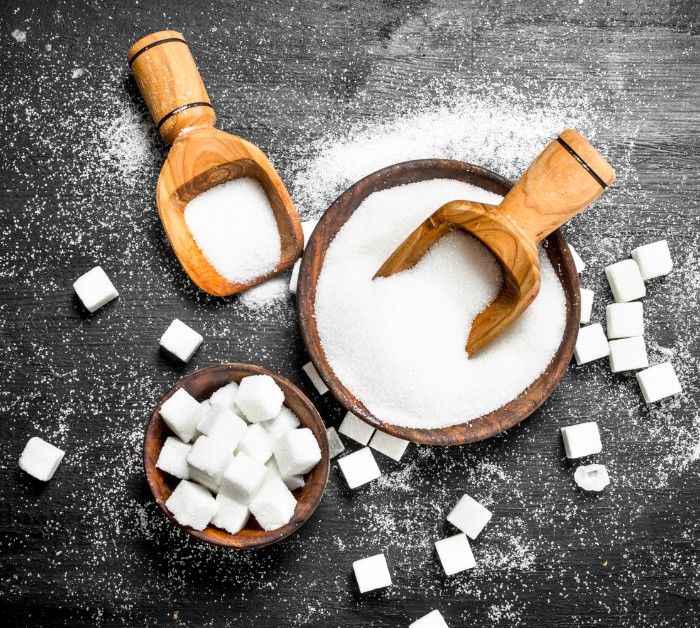Allulose, the new low-calorie sweetener
There is a new sugar substitute called allulose that is not an artificial sweetener. This low-calorie sugar came out in 2015 and just received FDA approval.
As a new sweetener that already manufacturers use in their products, you should be informed about it. So what’s the deal with allulose – Is it healthy? Safe to use?
We will try to find out the answers to these questions and much more about allulose in this article.
This post may contain affiliate links, which means we may receive a small commission, at no cost to you, if you make a purchase through a link. For more information, please see our disclosure.
What is allulose?
Allulose is not artificial sugar. It naturally occurs only in some foods like wheat, figs, and raisins.
Also known as psicose, d-psicose, d-allulose, or pseudo-fructose, allulose is a monosaccharide or single sugar like glucose and fructose. It is different from table sugar, known as sucrose made of glucose and fructose joined together.
Fructose has the same chemical formula as allulose but is arranged differently. This difference in structure prevents your body from processing allulose the way it processes fructose.
Like we mentioned before table sugar is made of glucose and fructose. Glucose is the main energy source for your body’s cells. Fructose needs to be converted into glucose by the liver before it can be used by the body.
When people eat a diet high in calories and fructose, the liver gets overloaded and starts turning the fructose into fat. We must mention that this is not happening when you eat whole fruits. They are real foods with low-calorie density and lots of fiber.
If a product lists added sugar as one of its main ingredients, be pretty sure it’s high in fructose.
Let’s go back to our natural sweetener-allulose. This was just to know and make a distinction between allulose and fructose.
When it comes to allulose, even it is absorbed into your blood by the digestive system, 70-84% of the allulose you consume is eliminated by the urine without being used as a fuel.
A study from 2010 showed that allulose resists fermentation by your gut bacteria which helps to minimize bloating, gases, and other digestive problems.
According to the FDA, allulose provides 0.4 calories per gram, which is many times lover than 4 calories per gram in sugar. Because our bodies don’t metabolize allulose into glucose it is virtually calorie-free.
We must mention that this rare sugar can be produced in a laboratory too by using enzymes to convert fructose from corn and other plants into allulose.
When it comes to taste and texture it’s identical to table sugar. Sweetness is similar to the sweetness of erythritol and it’s 70% as sweet as sugar.
Summary | What is allulose?
Allulose is a naturally occurring sugar found in figs, raisins, molasses, and brown sugar. It is 70% as sweet as sugar and has about 10% of the calories.
Is allulose an artificial sweetener?
An artificial sweetener or sugar substitute is a chemical added to some foods to make them taste sweet. It is made to taste like sugar or corn syrup and usually has a much lower energy value than sugar.
Examples include aspartame (NutraSweet and Equal), sucralose (Splenda), acesulfame potassium, neotame, and saccharin (Sweet’N Low).
Allulose is not an artificial sweetener, it is classified as “rare sugar” because is naturally found in small amounts in foods – including figs, raisins, maple syrup, and molasses. Like we mentioned before it’s a monosaccharide or simple sugar.
Arificial sweeteners are diferent. Let’s look at some examples:
- Sucralose, sold under the name Splenda is made by chemically altering sucrose so it doesn’t break down when ingested which means is non-caloric. It is 320 to 1000 times sweeter than sucrose.
- Aspartame is non-saccharide sweetener 200 times sweeter than sucrose. It is sold on the market by the names NutraSweet, Equal, or Canderel. The sweetness of aspartame lasts longer than that of sucrose, so it is often blended with other artificial sweeteners such as acesulfame potassium to produce an overall taste more like that of sugar.
- Saccharine is an artificial sweetener 300-400 times as sweet as sucrose, with effectively no food energy. It has a bitter or metallic aftertaste, especially in high concentrations. It is safe to use for individuals with diabetes.
Opposite of the artificial sweeteners allulose offers uncompromised taste and mouthfeel of sugar without the calories and glycemic impact. 70% sweet as regular sugar and it won’t affect your blood sugar in the same way.
Is allulose good for you?
It may help controlling blood sugar
Because allulose is new to the sweetener scene there is little long-term research that has been done, most of the studies are made on animals or on a very small group of people.
According to the studies that have been made till now allulose can be a powerful tool for managing diabetes. In a study from 2017 researchers found that allulose lowers blood sugar, increases insulin sensitivity, and decreases the risk of type-2 diabetes by protecting the insulin-producing beta cells of the pancreas.
In a controlled trial conducted on 20 individuals where each participant was given 5-7.5 grams of allulose with 75 grams of the sugar maltodextrin or just maltodextrin on its own.
Results from this trial showed that the group that took allulose experienced significantly lower blood sugar and insulin levels compared to the group that took maltodextrin alone.
May help control obesity rates
Obesity has an association with metabolic disorders like diabetes, high cholesterol, and cardiovascular diseases. Doctors agree that sugar is a contributing factor to obesity.
Substituting high-calorie sugars with a low-calorie alternative such as allulose may help control obesity rates.
In a research made on obesity rates, where rats were fed with a high-fat diet that contained supplements such as allulose, sucrose, or erythritol for eight weeks, the results showed that the rats given allulose gained less belly fat than the rats fed with sucrose or erythritol.
We must mention that erythritol like allulose provides virtually no calories and doesn’t raise blood sugar or insulin levels.
These studies on obesity and fat loss aren’t made on people yet, they are all made on animals. However, based on the controlled studies made till now which show lover blood sugar and insulin levels in people who took allulose, it seems it may help with weight loss as well.
Again this is just a presumption, more studies in humans must be made before we can make any conclusion.
For people with diabetes, this sounds like a promising alternative to sugar. However, allulose is still a sweetener. This means you would be likely to use it to make cookies or add a sweet taste to your coffee.
Just remember, because allulose comes from plants and contains just 0.4 calories per gram it doesn’t mean that you should start adding scoop after scoop to your morning coffee.
Downsides of allulose
Sugar substitutes like allulose if used in excess might make you constantly craving more sweet things. The more you use these sweeteners, the more you tend to dislike less sweet foods like fruits and veggies.
Sugar alcohols humans aren’t able to digest, it is the same with allulose. It’s possible consuming allulose can lead to tummy troubles (bloating, gas, diarrhea). Some people find allulose less problematic for their tummy problems than sugar alcohols. This depends on the individual.
In a study from 2018 conducted to investigate the GI tolerance for D-allulose in order to establish its daily acceptable intake level, was found that a 150-pound woman would have to eat 27 grams (7 teaspoons) at one time before it would likely make her inside unhappy.
According to the FDA, people may experience some abdominal discomfort from consuming large quantities of allulose, but those side effects are non-toxic and usually temporary.
Possible side effects of consuming too much allulose sweetener
- abdominal pain
- bloating
- diarrhea
- passing gas
- decreased appetite
- abdominal sounds
Allulose vs. erythritol and other sugar alternatives
Sugar substitutes that people use as sweeteners:
- stevia
- erythritol
- monk fruit
- aspartame
- saccharine
- sucralose
- neotame
Erythritol is made from fermented corn or cornstarch and it’s a sugar alcohol that occurs in small quantities in some fruits and fungi like grapes, melons, and mushrooms.
Erythritol sweetener is part of the family of sugar alcohols but it is unique compared to others like sorbitol or maltitol. Erythritol is the only one that has a glycemic index of zero and is easier to digest.
As a product erythritol can be found in granulated or powdered erythritol form or as a blend of erythritol and stevia. Read ingredients labels to check for dextrose, maltodextrin, or other additives.
Allulose and erythritol are both used for baking cookies and desserts, especially the new one – allulose is used more because bakes and freezes like sugar, making it a good option for baked goods and ice cream.
Manufacturers make aspartame and neotame by combining two amino acids and make sucralose from sucrose or table sugar.
These sweeteners are among the most researched food ingredients. FDA has approved these sweeteners for use in humans and is classified as generally recognized as safe.
Many manufacturers of dietary products, beverages, cosmetics, and mouthwashes use these low and no-calorie sweeteners instead of sugar.
How much and how to use allulose sweetener
How much allulose to replace sugar?
As we mentioned allulose is 70% as sweet as sugar so the correct conversion would be 1.3 times more than sugar. Many people use it as a 1:1 replacement for sugar without noticing a difference.
Where to use allulose according to FDA?
- nonalcoholic beverages
- cereals
- chewing gum
- frozen dairy desserts (ice cream, sorbet)
- frozen yogurt
- pudding and fillings
- jams and jellies
- fat based cream
- gelatins
Can you use allulose in a paleo or keto diet?
The Keto diet is very low in carbohydrates and high in fat. Allulose is a carbohydrate but it doesn’t provide calories, so it’s keto compatible.
The main core of the paleo diet is eating fruits, vegetables, nuts, organ meats, and excluded all kinds of processed foods. If you follow a paleo diet you can consume allulose in its natural form by eating dried fruits like figs for example.
Where to buy allulose?
You can find allulose sweetener in many larger supermarkets or health food stores. You can also order granulated allulose sweetener here and use it as a natural sweetener for coffee or tea, sprinkled over granola, or in baked goods!

Final thoughts about low-calorie sweetener allulose
Allulose is considered a new sweetener in the market. Since there are not many studies conducted on humans it is not recommended to use it like diabetes or weight management tool. It’s still a sweetener and using it in moderation is safe.
Doctors and nutritionists still advise using whole foods – vegetables, fruits, whole grains, healthy proteins, and fats more often.
The U.S. Food and Drug Administration classifies d-psicose (allulose) as “generally recognized as safe,” and recently ruled that allulose would be excluded from total and added sugar counts on nutrition labels.
And as always it’s good to consult with your doctor or nutritionist first before start using allulose as a sweetener especially if you have some problems with blood sugar levels.




